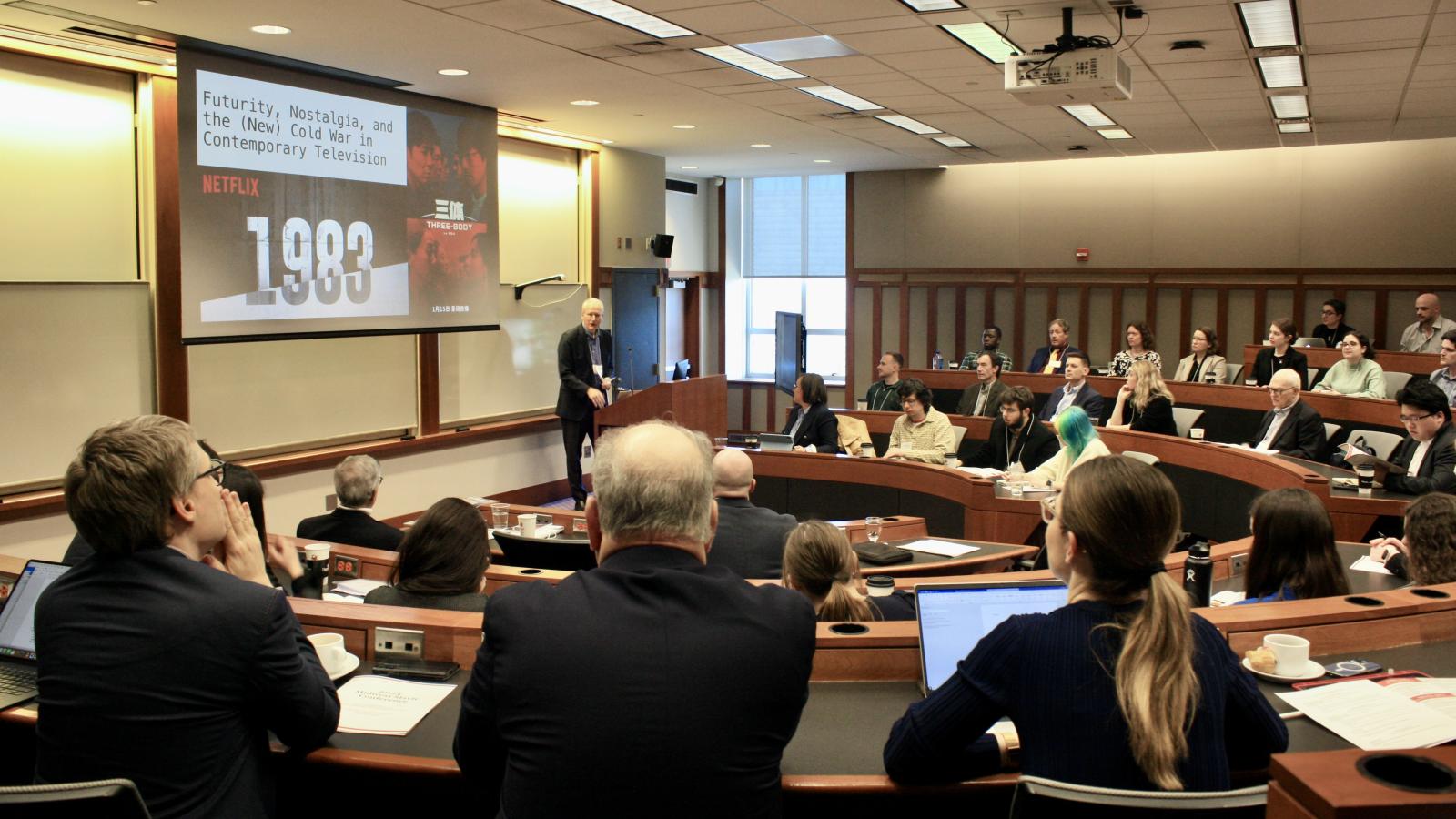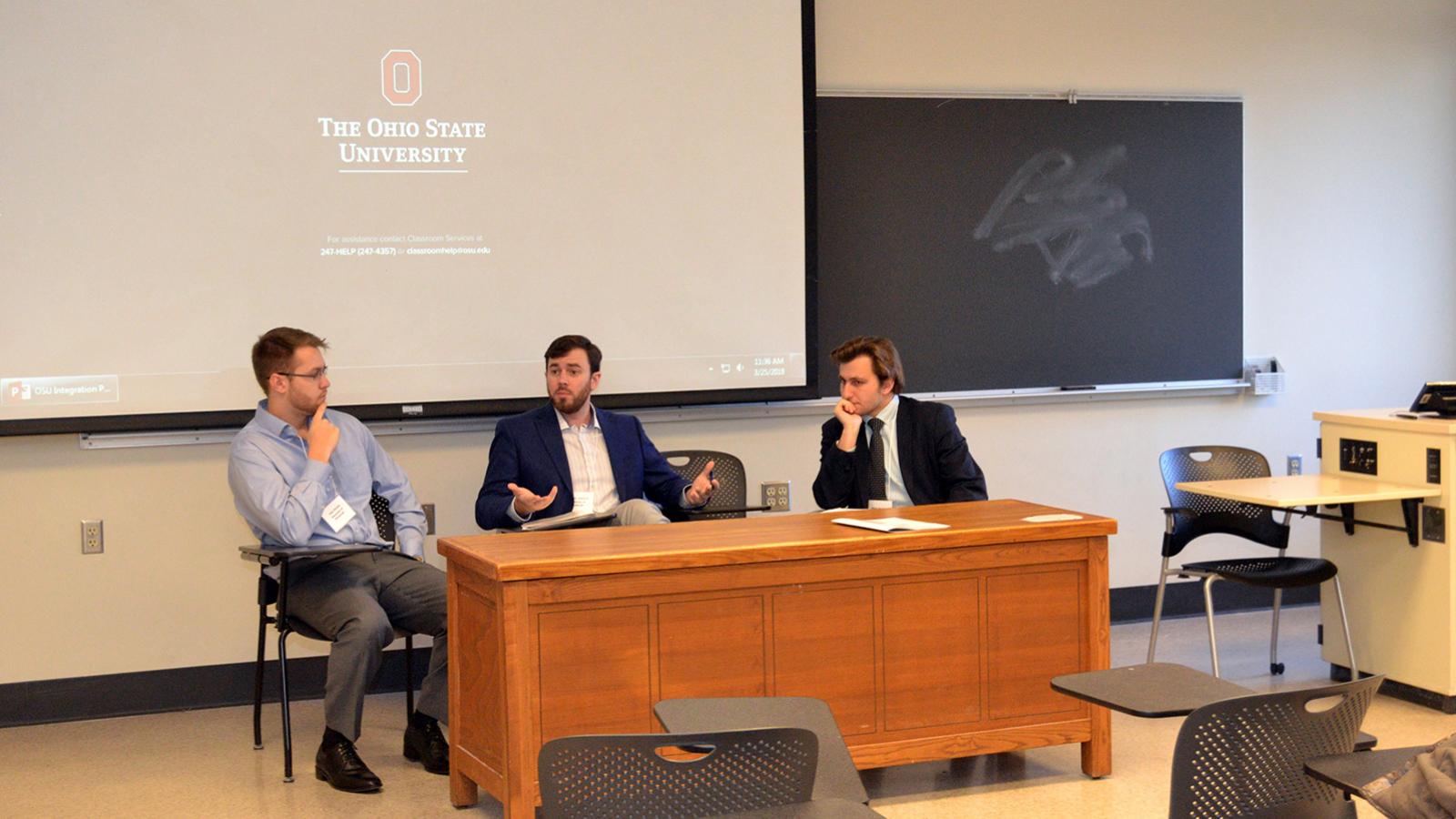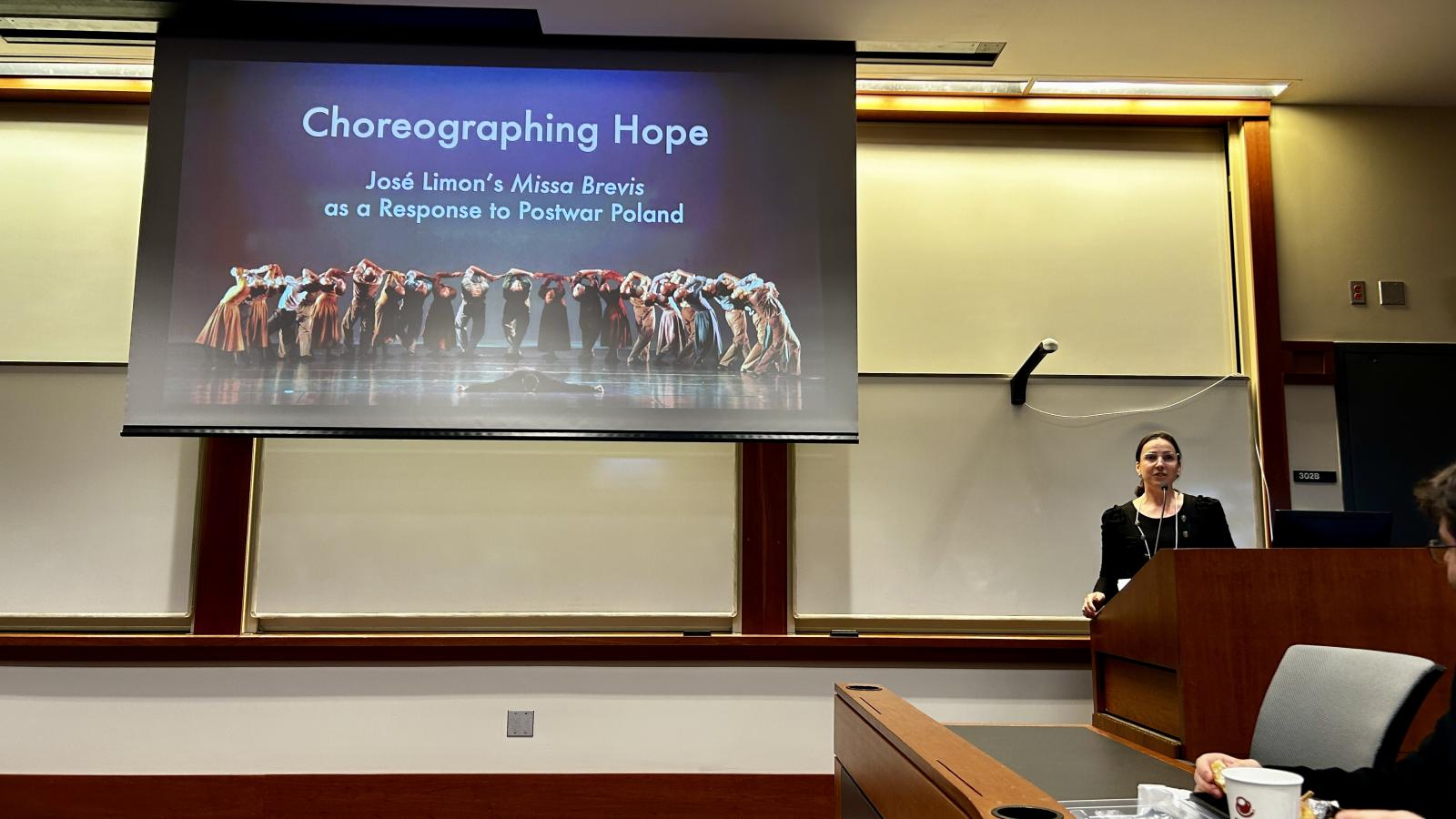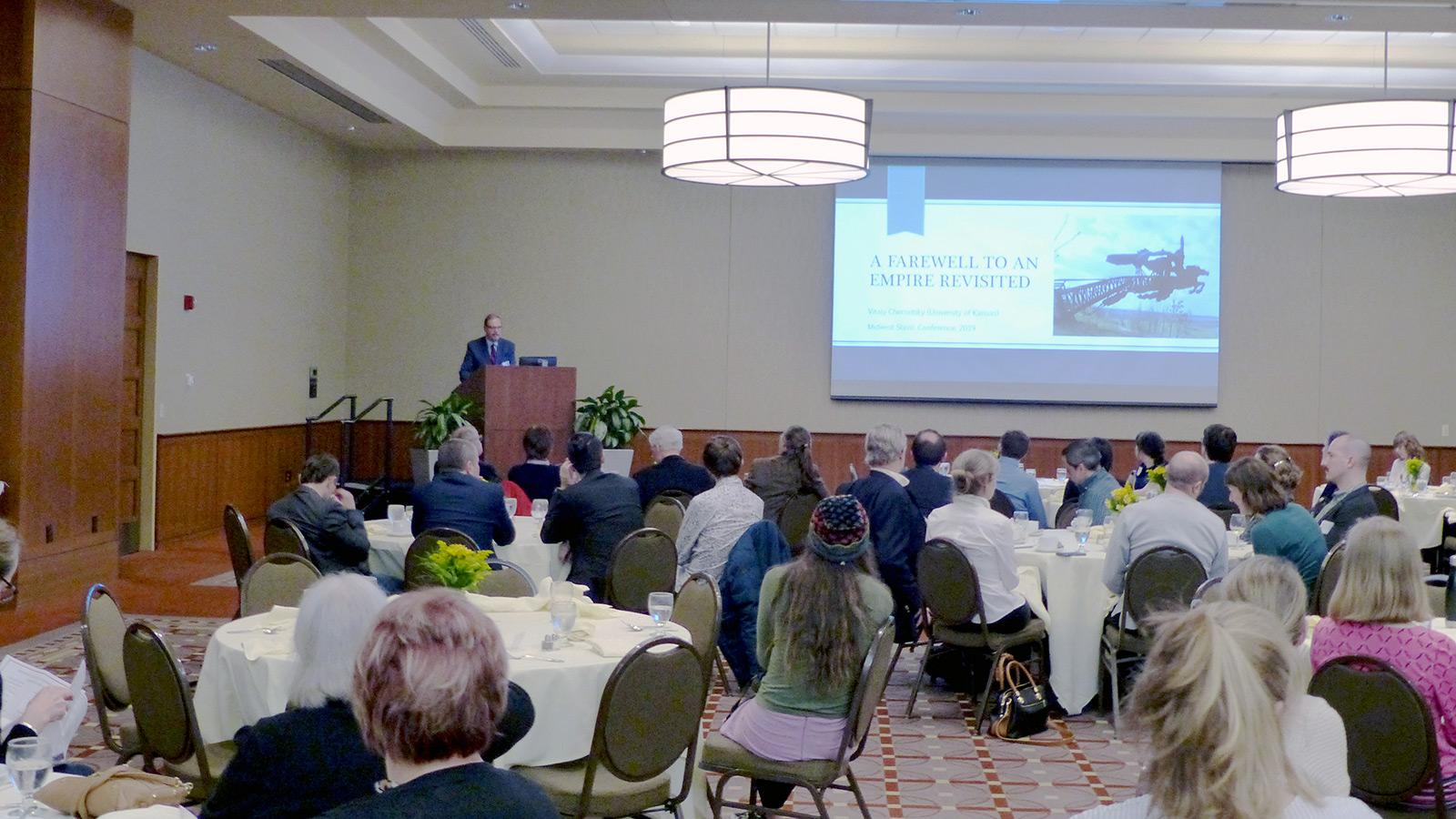Midwest Slavic Conference
General Information on the Conference
Each year the Midwest Slavic Association and CSEEES partner together to host the Midwest Slavic Conference. The conference has been held on the OSU campus since 2003 and is normally held in the spring. Participation is open to undergraduate and graduate students, faculty, and independent scholars from across the United States and abroad. Approximately 30 panels are held each year with over 250 attendees from institutions throughout the country and internationally. Conference events include a keynote address, reception, and panels covering film, political science, culture, history, linguistics, and many other disciplines that focus on all countries and regions of Eastern Europe and the former Soviet Union.
Upcoming Conferences
2026 Midwest Slavic Conference
March 27-29, 2026 - Columbus, OH
2026 Conference Panel Schedule
The Midwest Slavic Association and The Ohio State University’s (OSU) Center for Slavic, East European and Eurasian Studies (CSEEES) are pleased to announce the 2026 Midwest Slavic Conference to be held in-person in Columbus, OH, on March 27-29, 2026. The conference committee invites proposals for papers on all topics related to the Slavic, East European and Eurasian world, particularly those related to the theme of crisis and trauma. This year’s theme will delve into the lasting impact of trauma and the multifaceted and complex responses across Eastern Europe and Eurasia; examining how war, displacement, authoritarianism and cultural erasure have shaped collective memory, rebuilding and resilience. By highlighting voices from the post-Soviet space, the Balkans, the Caucasus and Central Asia, the conference invites scholars, artists and practitioners to explore how crisis and trauma are processed and transformed through community and social practices, literature and the arts, oral and material history, policy and more. Through interdisciplinary dialogue, this theme aims to foster critical reflection and creative inquiry into the politics, poetics, and lived experience of personal and communal damage that may forge a path toward recovery and fortitude or, alternatively, may resist such tidy narrative resolutions.
The conference will commence at 5:30PM on Friday with a keynote address by Dr. Jehanne Gheith (Duke U.). Building on the keynote address, a plenary panel will follow on Saturday morning. Panels by conference participants will then be held on Saturday from 10:30AM-4:45PM and Sunday from 8:30AM-11:45AM.
Abstract and Panel Submissions
Please note that under Ohio law SB1, papers and/or panels devoted specifically to issues of diversity, equity and inclusion are not permitted. For more information, please click here.
Please submit a one-paragraph abstract and C.V. in a combined, single PDF file using our submission portal by 11:59 PM EST on Friday, January 23rd. Undergraduate and graduate students are strongly encouraged to participate. Interdisciplinary work and pre-formed panels are encouraged. Proposals for individual papers are also welcome.
Registration is required to attend all conference events and activities.
Deadlines
- Abstract and C.V. Deadline: January 23, 2026
- Notification of Acceptance: February 16, 2026
- Scheduling Conflicts Due: February 19, 2026
- Panels Announced: February 20, 2026
- Registration Opens: February 24, 2026
- Final Papers to Chair: March 20, 2026
- Presenter Registration Deadline: March 24, 2026
Registration and Fees
Registration is REQUIRED to attend all conference events and activities. Registration will include entry to all conference panels as well as all special events listed in the Special Events section below.
Attendance at the keynote is NOT included with registration and must be purchased separately.
Presenters
- Students: $50*
- Faculty/Independent Scholars: $75
General Attendees
- Student Attendees: $25*
- Non-Student Attendees: $35
Keynote Reception Fee
- $30 per person
*Donated Registrations for Young Scholars of Slavic Studies
Want to support up and coming scholars in our field? This year we have created an option for faculty and independent scholars to donate conference registration(s) for undergraduate and graduate students who are participating as presenters or general attendees. This will allow students to enjoy the conference to the fullest extent.
Students who are interested in receiving a waiver code for donated registrations should email CSEEES at cseees@osu.edu after panels are announced on February 20. Donated registrations will be available on a first come, first served basis.
Special Events: Friday, March 27
Opening Reception and Keynote Address with Dr. Jehanne Gheith (Duke U.)
Friday, March 27, OSU Faculty Club, Grand Lounge on the 1st Floor (181 S Oval Mall, Columbus, OH 43210)
- Opening Reception, 5:30PM-6:30PM
- Keynote Address, 6:30PM-8:00PM
Attendance to the keynote is not included in the cost of conference registration and must be purchased separately. Attendance is $30 per person.
“It Could Happen Again”: Memory, Trauma, and Repair in and after the Gulag
In the 1990s, a time of relative openness and hope in Russia, Dmitrii Ivanovich, a Gulag survivor, would not speak off-script about his experiences, but instead read me a prepared statement. He would not answer questions, because, he said, “It [the camps] could happen again.” He was, of course, reading the situation with great accuracy.
In my keynote, I will explore the narratives of three Gulag survivors in some depth: two who lived through the Gulag themselves, and one daughter of Gulag survivors. Traumatic experience demands some depth of exploration, but as I delve into these individual accounts, I will also suggest wider intergenerational effects of this traumatic experience.
It is critical that we understand that "trauma" is culturally informed and is not everywhere the same. For example, the public silence that surrounded the Gulag had both personal and societal effects for the experience and expression of trauma and affected/s the paths to repair. The repression of information around Gulag experience, also, as Nanci Adler and others have argued were essential to the formation and maintenance of state power in Russia. In a course that I taught last year with Anthropologist Michele Rivkin-Fish, on Memory, Trauma, and Healing, in which we explored the effects of traumatic experience in Ukraine/Russia and Palestine/Israel. Some of the materials we used and questions students raised, show the peculiar difficulties of understanding the long reach of trauma and I will bring some of those into this talk.
Finally, I will explore both the resilience of those who lived through the Gulag and the particular workings of this experience, that resist “closure”-which I see as its own kind of repair. I bring my experience both as a scholar of Russian culture and as a trauma-informed clinician to the talk. I also see this talk as interactive in the sense of sharing knowledge. The topic of the effects of trauma is timely and complex and it is vital for us to deepen our understandings of it through rich conversation.
Special Events: Saturday, March 28
Plenary Panel
8:30-10:15AM, Pfahl Hall, Blackwell Inn and Conference Center (2110 Tuttle Park Pl., Columbus, OH 43210)
Chair
- Dr. Alisa Ballard Lin (Midwest Slavic Association President, Ohio State U.)
Panelists
- Dr. Ariel Otruba (Arcadia U.)
- Dr. Diana Sacilowski (Ohio State U.)
- Dr. Natalia Vygovskaia (Miami U.)
3:15-4:45 PM, Blackwell Inn and Conference Center
The Center for Slavic, East European and Eurasian Studies at The Ohio State University is excited to host the 2026 Midwest REEE Lightning Talks, held in conjunction with the 2026 Midwest Slavic Conference. Lightning talks are short, fast-paced presentations (3–5 minutes) that allow undergraduate students to showcase their research, creative work, or projects in a concise format designed to spark conversation and collaboration. This event offers a dynamic platform for students conducting guided research in any discipline related to Eastern Europe and Eurasia to practice communicating their work to a diverse audience.
Eligibility
This event is open to undergraduate students who are or have conducted guided research with a faculty member from their home institution. Additionally, students who have submitted a paper proposal to the Midwest Slavic Conference but have been recommended to present a lightning talk by the conference review committee are also eligible. Students may present either a paper OR a lightning talk during the conference, but not both. All participating students must register for the conference as student presenters, but are eligible to request a registration waiver from the Young Scholars of Slavic Studies fund.
Format
For ease of accessibility, students are asked to create a presentation (maximum of 4 PowerPoint slides, inclusive of a title slide). On March 28, presenters will give a 3-5-minute oral presentation of their research to a panel of two judges and audience members (faculty, students, and members of the general public). Each judge will ask each student one question and assess their presentations.
Judging Criteria
All talks will be judged out of 25 points for the following criteria: aesthetic design/readability (5 points), quality of oral delivery (5 points), clarity of argument (5 points), strength of evidence, and originality of research (5 points).
Want to submit a proposal?
Participants must submit their poster idea, title, and general abstract (5-6 sentences) of their topic and argument to CSEEES (cseees@osu.edu) by Friday, January 23, 11:59 PM in order to be considered eligible. Only 8 poster presentations will be selected due to time constraints. More details can be found by scanning the QR code. If you have additional questions, please send them to cseees@osu.edu.
5:00-5:30 PM, Pfahl Hall, 2nd Floor Foyer
All registered conference attendees receive membership through their registration fee!
Join the Midwest Slavic Association (MWSA) for our annual meeting! MWSA supports Slavic, East European, and Central Asian studies in the Midwest region of the U.S. and beyond. We'll discuss ideas for future conferences, provide updates, and more. This year will also be welcoming our incumbent President, Vice-President, and Graduate Student Representative. We hope to see you there!
To learn more about MWSA, please visit our webpage.
General Conference Information
We do not provide funding for lodging for any participants at the conference. We encourage undergraduate and graduate students to apply for travel grants from their home universities to cover all travel costs. If any documentation is needed to apply for funds, please email cseees@osu.edu.
Other lodging options include:
- The Blackwell Inn (on-campus)
- Fairfield Inn and Suites (off-campus)
- Graduate Hotels Columbus (off-campus, ask for OSU Visitors Rate for 10-20% discount, offers bike rentals)
- Hilton Garden Inn (off-campus)
- Holiday Inn (off-campus, offers shuttle transportation)
- Holday Inn - Staybridge Suites OSU (off-campus)
- Homewood Suites (off-campus)
- Hyatt House Columbus (off-campus)
- Hyatt Place (off-campus)
- Red Roof Inn (off-campus)
- Spring Hill Suites (off-campus, offers shuttle transportation)
- Varsity Inn South (off-campus)
For those driving to campus, self-pay parking is available at parking garages close to the conference site in the Lane Avenue Garage and the Tuttle Garage.
A variety of taxi cab services also operate in the Columbus metro area, as well as Lyft and Uber.
- Yellow Cab of Columbus – (614) 444-4444
- Columbus Taxi Service – (614) 262-4444
- Blue Cab Company – (614) 236-4444
- Acme Taxi – (614) 777-7777
- Orange Cab – (614) 414-0000
- United Taxi – (614) 449-9999
You should prepare a presentation of 15-20 minutes in length, generally material that can be covered in an 8-10 page paper. If presenting or reading from a paper, be aware that reading directly from a paper is less engaging. Try to make eye-contact with the audience and not read word-for-word from the paper. Each panelist will present, then questions and discussion led by the chair will be at the end of the panel. Be respectful of other panelists' time to allow equal discussion and time for all members. Send your presentation materials to the panel chair promptly and do not send them longer versions of your paper, what you send them should represent what you will present at the conference. The conference rooms will each have a projector and internet access. Attendees should bring their own laptops and any special cords needed for connecting to a/v equipment. You can use PowerPoints or another presentation program, film clips, or other visual aids. Please prepare a backup in case you encounter any issues accessing your presentation. The conference site will have staff on hand to help. If you have any questions about a/v or software in the conference rooms, please email cseees@osu.edu in advance.
There are many dining options located in easy walking distance from the conference location, the Blackwell Inn and Conference Center. Below are a few close options but by no means is it an inclusive list.
- Buckeye Donuts-1998 North High St
- Buffalo Wild Wings- 2151 N High S
- Charleys Philly Steaks- 1980 N High St
- Chop Shop- 2159 N High St
- Chipotle Mexican Grill - 2130 N High St
- Donatos- 2084 N High St
- Diaspora-2118 North High St
- Dunkin Donuts- 2060 N High St
- McDonald's-1972 North High St
- Moe's Southwest Grill- 2040 N High St
- Noodles and Company- 2124 N High St
- Panda Bear Express- 2044 N High St
- Panera Bread- 300 W Lane Ave
- Pita Pit-1988 North High St
- Qdoba Mexican Grill-1956 North High St
- Red Chili-1948 North High St
- Sbarro-1990 North High St
- Subway- 2187 Neil Av
- Starbucks - 2130 N High St
- Tommy’s Pizza-174 W Lane Av
- Varsity Club Restaurant & Bar- 278 W Lane Ave
- Waffle House, 1712 North High St.
- Wendy's-2004 North High St
- White Castle-2106 N High St
Knowledge Bank is a digital repository maintained by OSU's University Libraries. Conference participants can elect to have their abstracts, papers, and PowerPoints included in Knowledge Bank. Within Knowledge Bank, CSEEES has created a community for the Midwest Slavic Conference that contains programs and participants' materials. Knowledge Bank is accessible through the University Libraries' website and is open to everyone, including those not affiliated with OSU. Papers are searchable and downloadable, helping to increase the impact of the conference and providing a way to spread participants' work. Learn more about the Knowledge Bank.
Check out CSEEES' community today!
Prior Conferences
Friday, April 4 - Sunday, April 6, 2025
2025 Co-Sponsors
Gold Sponsors
- Academic Studies Press; the Department of Slavic and East European Languages and Cultures at Ohio State U.; the Hilandar Research Library at Ohio State U.; and the Mershon Center for International Security
Studies at Ohio State U.
Silver Sponsors
- Bard College; the Center for Russian, East European, and Eurasian Studies at U. of Texas at Austin; and the Davis Center for Russian and Eurasian Studies at Harvard U.
Bronze Sponsors
- The Center for Russian, East European, and Eurasian Studies at U. of Michigan; the Department of History at Ohio State U. and the Department of Linguistics at Ohio State U.
Keynote address: "New Russian Apocalypticism"
- Presented by Dr. Mikhail Epstein (Emory U.)
Plenary panel: “Shaping East European and Eurasian Culture and History: Forging Authentic Narratives Through AI, Media, and Storytelling Methods”
- "Faking It: What Fictions of AI Reveal About the Future of Human Language" by Dr. Molly T. Blasing (U. of Kentucky)
- "Media, Mind, and Authenticity" by Dr. Ludmila Isurin (Ohio State U.)
- "Unsettling Contested Narratives: Storytelling and the Quest for an Authentic History" by Dr. Malkhaz Toria (Ilia State U., Fulbright Visiting Scholar at the Davis Center at Harvard U.)
Friday, April 5 - Sunday, April 7, 2024
2024 Co-Sponsors
Gold Sponsors
- The Department of Slavic and East European Languages and Cultures at Ohio State U. and the Mershon Center for International Security Studies at Ohio State U.
Silver Sponsors
- Academic Studies Press, the Association for Slavic, East European, and Eurasian Studies; the Center for Russian, East European, and Eurasian Studies at U. of Texas at Austin; the Department of Linguistics at Ohio State U.; the Hilandar Research Library at Ohio State U.; Kenyon College, and the Robert F. Byrnes Russian and East European Institute at Indiana U., Bloomington
Bronze Sponsors
- The Center for Russian, East European, and Eurasian Studies at U. of Michigan; the Department of Political Science at Ohio State U.; and the Summer Language Institute at U. of Pittsburgh
Keynote address: "Cold War: Then and Now"
- Presented by Dr. Richard Herrmann (Ohio State U.)
Plenary panel: “Echoes of the Cold War: Past and Present Perspectives Across the Regions”
- "Futurity, Nostalgia, and the (New) Cold War in Contemporary Television" by Dr. Julia Keblinska (Ohio State U.)
- "Reimagining Yugoslavia: Lessons for Today's World" by Brano Mandić (Editor in Chief and Founder of Normalizuj.me)
- "Glasnost and the End of the USSR" by Jeffrey Trimble (Board of Directors Chair at Eurasianet)
Friday, March 24 - Sunday, March 26, 2023
Co-sponsored by The American Councils for International Education, The Association for Slavic, East European, and Eurasian Studies, The Department of Slavic and East European Languages and Cultures at The Ohio State U., The Havighurst Center at Miami U., The Society for Slovene Studies, U. of Pittsburgh’s Summer Language Institute, and U. of Washington's Roma Boniecka Endowed Program for Slovene Studies.
Keynote address: "Gothic Displacements and the Russian Imperial Conquest: Literary Cases of Finland and Ukraine" with Dr. Valeria Sobol (U. of Illinois, Urbana-Champaign)
Plenary panel: "Fostering Community and Solidarity in a Time of Plague: Uniting Readers Across the Globe Through Russian Literature" by Dr. Anna Barker (U. of Iowa), "The Quotidian and the Crisis: Documenting the Immigrant Experience through Food Writing" by Dr. Philip Gleissner (Ohio State U.), and "Demopolitics, A Key to Understanding Modern Central-Eastern Europe and Beyond: Evidence from Poland" by Dr. Jarosław Szczepański (U. of Warsaw)
Friday, April 1 - Sunday, April 3, 2022
Co-sponsored by Association for Slavic, East European, and Eurasian Studies.
Keynote address: "Looking Across Species in the Anthropocene: Carnivores and Compassion" by Dr. Ian Helfant (Colgate U.)
Plenary panel: "Who Owns Icebergs? Seeking Multidisciplinary Solutions in a Legal Vacuum" by Dr. Matthew Birkhold (Ohio State U.), "What Can a Cosmic Collision Teach Us about Climate Change? The 1908 Tunguska Explosion and Environmental Perils of the Future" by Dr. Andy Bruno (Indiana U., Bloomington), and "Fighting "Future Famines" after the First World War" by Dr. Maria Fedorova (Macalester College).
Thursday, April 15 - Saturday, April 18, 2021
The 2021 conference was held in a virtual, online format. Information is available on the 2021 Midwest Slavic Conference Website.
Keynote address: “The Geography of Joy: Alex Dubas, Voices of Russian Happiness, and the Art of Translation”, by Dr. Yvonne Howell, University of Richmond
Plenary panel: “Manufacturing Consent: The Politics of Showmanship in Putin’s Russia” by Dr. Hannah S. Chapman, Miami University, “Temporalities of Concrete: Housing Imaginaries at the Margins of Europe” by Dr. Smoki Musaraj, Ohio University, and “War Memory as Entertainment in 21st Century Russia” by Dr. Karen Petrone, University of Kentucky
Sunday, September 13, 1:00 - 4:00PM EDT
Co-sponsored by The Association for Slavic, East European, and Eurasian Studies, Department of History OSU, Department of Linguistics OSU, Department of Slavic and East European Languages and Cultures OSU, Department of Women's, Gender, and Sexuality Studies OSU, the Undergraduate International Studies Program OSU, and University Libraries.
The 2020 Conference was originally scheduled for April 2020 but cancelled due to the COVID-19 pandemic. The originally scheduled conference keynote and plenary panel were held on September 13 online. No panels were held.
Keynote address: "Ordinary Apocalypse and Everyday Science Fiction" by Dr. Anindita Banerjee, Cornell University
Friday, April 5th - Sunday, April 7th, 2019
Co-sponsored by Association for Slavic, East European, and Eurasian Studies, Department of History, OSU, Department of Slavic and East European Languages and Cultures OSU, The John Glenn College of Public Affairs OSU, and the Undergraduate International Studies Program OSU.
The 2019 conference had over 60 panelists and over 100 attendees. Papers, abstracts, and the conference program can be found in the conference's Knowledge Bank collection.
Keynote address: “A Farewell to an Empire Revisited” by Dr. Vitaly Chernetsky, University of Kansas
Friday, March 23rd - Sunday, March 25th, 2018
Co-sponsored by The Association for Slavic, East European, and Eurasian Studies, Center for African Studies, OSU, Center for Latin American Studies, OSU, Department of History OSU, Department of Political Science, OSU, Department of Slavic and East European Languages and Cultures, OSU, Department of Women's, Gender, and Sexuality Studies, OSU, East Asian Studies Center, OSU, The Global Mobility Project OSU, The John Glenn College of Public Affairs, OSU, The Mershon Center for International Security Studies, OSU, Middle East Studies Center, OSU , The Resource Center for Medieval Slavic Studies, OSU, The Undergraduate International Studies Program OSU
Keynote address: "The Great Departure: Mass Migration from Eastern Europe and the Making of the Free World" by Dr. Tara Zahra, University of Chicago
Friday, April 7th - Sunday, April 9th, 2017
Co-sponsored by The Association for Slavic, East European, and Eurasian Studies, The Center for Slavic and East European Studies OSU, The Department of Comparative Studies OSU, The Department of History OSU, The Department of Slavic and East European Languages and Cultures OSU, The Department of Women's, Gender, and Sexuality Studies OSU, The Hilandar Research Library OSU, The Mershon Center for International Security Studies OSU, The Midwest Slavic Association, The Office of International Affairs OSU, The Resource Center for Medieval Slavic Studies OSU, and The Undergraduate International Studies Program, OSU.
Over 70 panelists presented at the conference with close to 150 attendees. Papers, abstracts, and program from the conference can be found in the conference's Knowledge Bank collection.
Keynote Address: "Putin Country: A Journey into the Real Russia, The Challenge of Covering Russia" by Anne Garrels
Prior Conference Programs
Programs from prior conferences can be found on CSEEES' Knowledge Bank community along with other materials from the conference.




